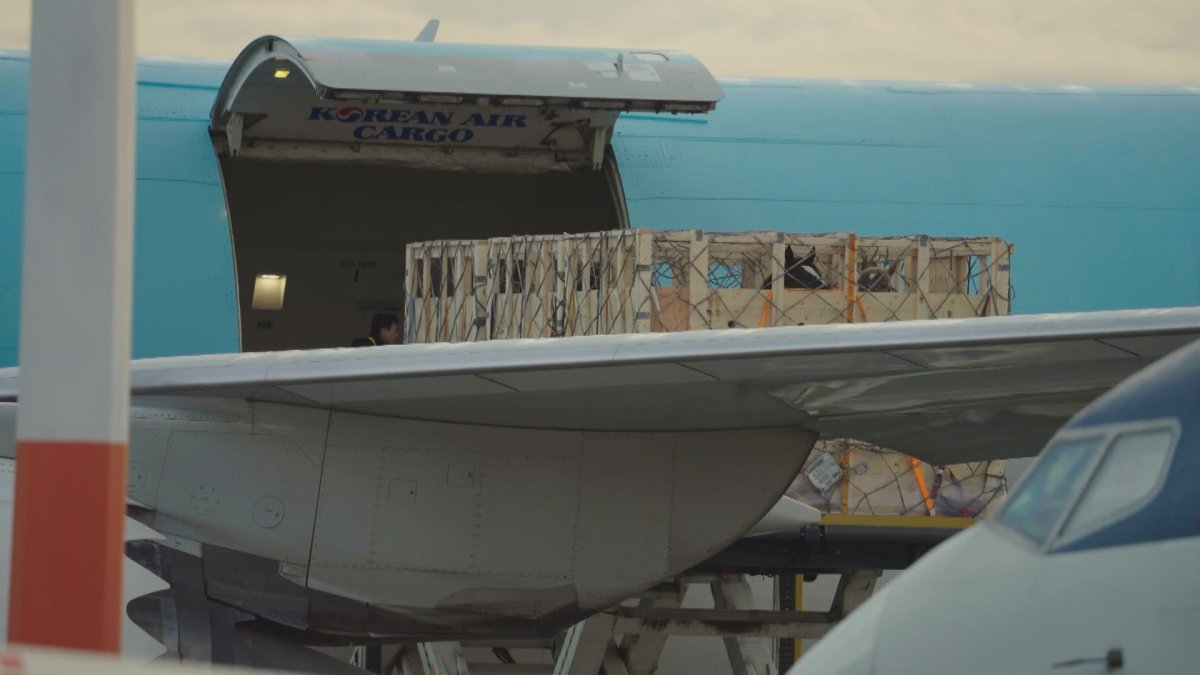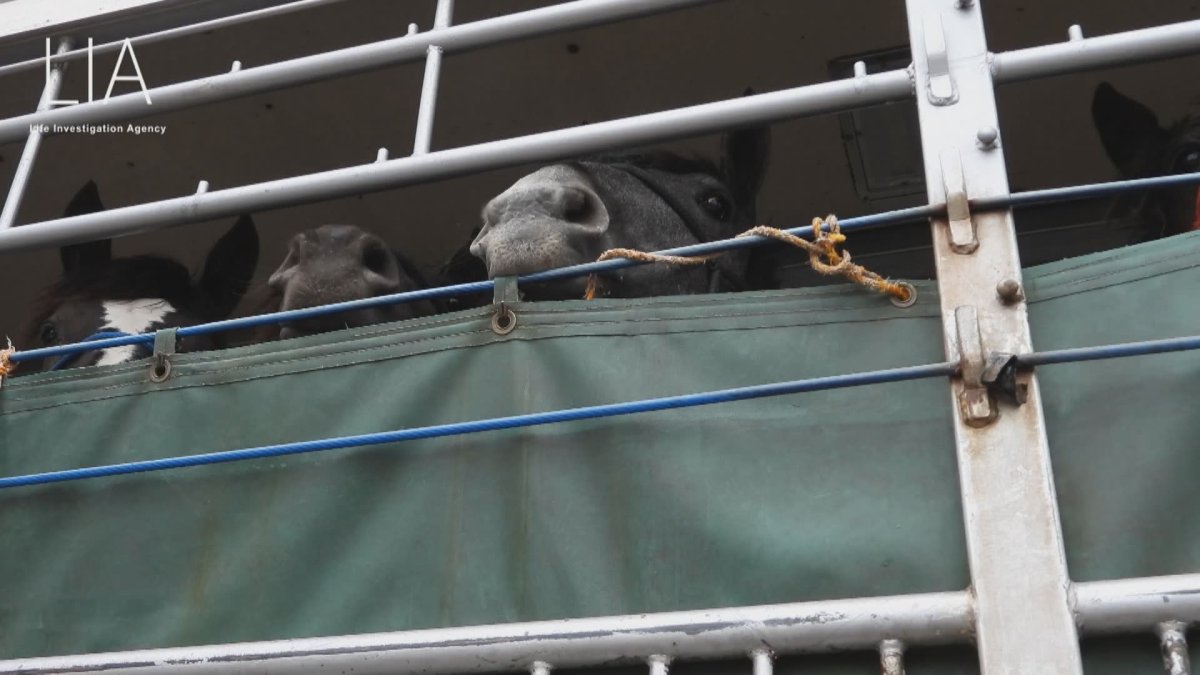A group of animal rights organizations are calling on the Canadian Food Inspection Agency (CFIA) to halt the practice of exporting live horses overseas for slaughter.
This comes after the organizations Animal Justice and Life Investigation Agency, a Japan-based animal protection group, conducted an investigation that they say revealed a “disturbing pattern” of flying live horses from Canada to Japan for slaughter.
The groups tracked and obtained footage of four shipments of horses from Edmonton to Japan for slaughter. The organization alleges that each shipment exceeded the legal time limit of 28 hours to transport horses without food, water, or rest. They say the animals were transported from rural Alberta to Edmonton International Airport, where they waited in crates for hours before being flown to Alaska and then to Japan.
“We were absolutely shocked by what we found. The industry has been saying all along that once horses land in Japan they have food and water and rest really quickly, but we found that’s absolutely not the case,” Kaitlyn Mitchell, the director of legal advocacy for Animal Justice, told Global News.
Horses, destined for Japan, are loaded onto a cargo ship in Edmonton.
Courtesy / Animal Justice
“These shipments are taking between four hours and 20 minutes and six and a half more hours after landing in Japan. Which is shocking; it means these horses are in transport for way longer than we every realized.”
In a report released last week, Animal Justice says based on their investigation and an analysis of government documents obtained by the Canadian Horse Defence Coalition, over the past seven months all shipments of horses from Winnipeg exceeded the legal time limit, while 60 per cent of shipments from Edmonton exceeded the time limit as well.
Now the organization, along with several other animal rights groups including the Winnipeg Humane Society, are calling on the Canadian Food Inspection Agency to halt the practice of exporting horses overseas.
“We have asked the CFIA to look into the shipments that we documented, and we are calling for an immediate moratorium on these shipments until the companies involved can show that they will comply with the law,” Mitchell said.
“We think it’s important that the CFIA take this action now because, based on our findings, it’s virtually guaranteed that shipments will go over the 28-hour legal limit, which means that horses will be suffering needlessly. They have to comply with the law, and if they can’t, then they simply shouldn’t be operating.”
Horses in a crate on the tarmac at a Japan airport.
Courtesy / Live Inspection Agency
Horses in transport after arriving in Japan.
Courtesy / Live Inspection Agency
Bill C-355, an act to ban exporting horses by air for slaughter, is currently under review by the Senate. Mitchell says with the Senate now in recess for the summer, the legislation won’t be revisited until the fall, which means more horses will be shipped in the meantime — a reason why she wants the CFIA to take action now.
“Exporting horses from rural Alberta and rural Manitoba all the way over to Japan causes undeniable suffering,” she said. “These horses are in transport for hours and we know that these horses are flight animals, they are not trained for travel so they endure stress on the journey.
“They’re at risk of injury, they’re at risk of illness, and some of them have even died on the journey overseas because of how long it takes and also because of the conditions that they’re transported in.”
Animal welfare organizations say approximately 4,000 horses are flown from Canada to Japan for slaughter each year.
Courtesy / Live Inspection Agency
A horse is unloaded after arriving in Japan.
Courtesy / Live Inspection Agency
Brittany Semeniuk, the animal welfare specialist with the Winnipeg Humane Society, says a moratorium could prevent more horses sharing a similar fate.
“The Canadian Food Inspection Agency has the ability to stop these shipments, because as we’ve seen in the video, virtually every shipment leaving Canada is now violating federal legislation,” Semeniuk told Global News, noting that Winnipeg is one of three airports in Canada that ships live horses overseas for slaughter, along with Calgary and Edmonton.
“A moratorium would stop these shipments as soon as possible and no more horses would be going through this horrific gruelling journey just to be slaughtered,” Semeniuk said.
Response for the equine exporting industry
Kevin Wilson, with the Canadian Equine Exporters Association, says the organization disputes the claims.
“As someone involved in the industry, I’m very shocked at the stories they’re portraying to the media are in direct conflict to the third party audited process that we’ve undergone to be very transparent in this industry,” Wilson told Global News.
“I look forward to them bringing some evidence to see what they have for actual facts and not just allegations.”
Wilson says the Canadian horse meat industry is highly regulated by the CFIA. Draft horses are bred specifically for the industry and raised on farms in Western Canada, before being shipped to a feed lot where they’re raised for another 15 to 18 months, he says.
“Once they are selected to go, CFIA visits the ranch, they visually inspect the horses, they take blood samples and draw up health charts for these animals prior to ever leaving the ranch,” Wilson said. “And once they’ve passed all the bloodwork and the health papers are issued then we register the quarantine location in Japan for once these horses land over there.”
Wilson says the horses are again inspected by CFIA veterinarians once they land in Japan.
“Once these horses arrive in Japan, they spend a minimum of three months there, under care of their new Japanese owners,” he said.
Wilson says their association along with the Canadian Meat Council, the Canadian Veterinary Medical Association, and the Canadian Federation of Agriculture have written letters opposing the Bill C-355. He also says a moratorium or an outright ban would be detrimental to the industry.
“We believe in facts, we follow science and the evidence,” Wilson said. “How a moratorium would affect the industry — it would be detrimental to several Canadian farm families.”
“The reality of it is, there are several Canadians that have invested their life’s work into this industry to raise these animals for this unique market,” he added.
“Canadian ranchers, Canadian farmers, Indigenous farmers all across Canada — so it would create a terrible problem financially for these farmers. And we want to be sure that people understand that this is not a one-off market that has done just a very unique deal for one year. We have done this for over 20 years, for myself, and people before me have done this for over 40 years. Flying horses is not new.”
Global News has also reached out to the Canadian Food Inspection Agency for comment but did not receive an official response by deadline.





